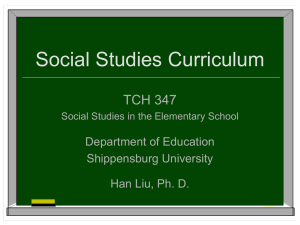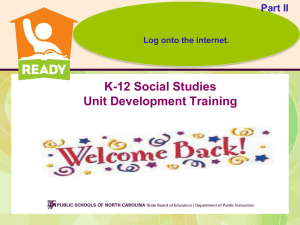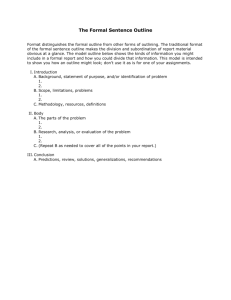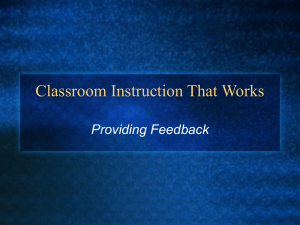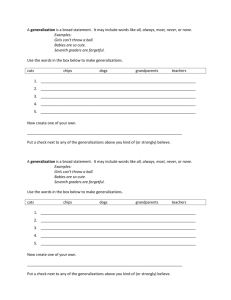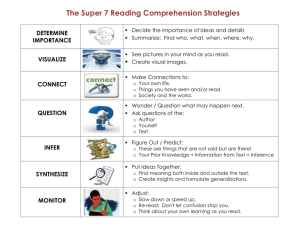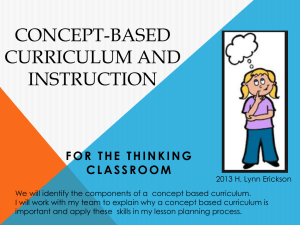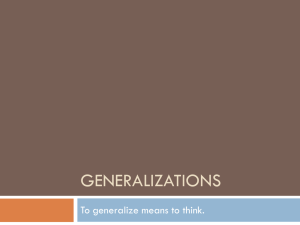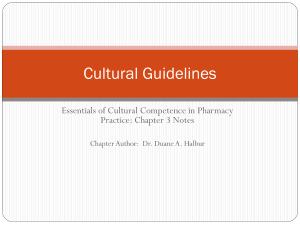Concept-based curriculum
advertisement
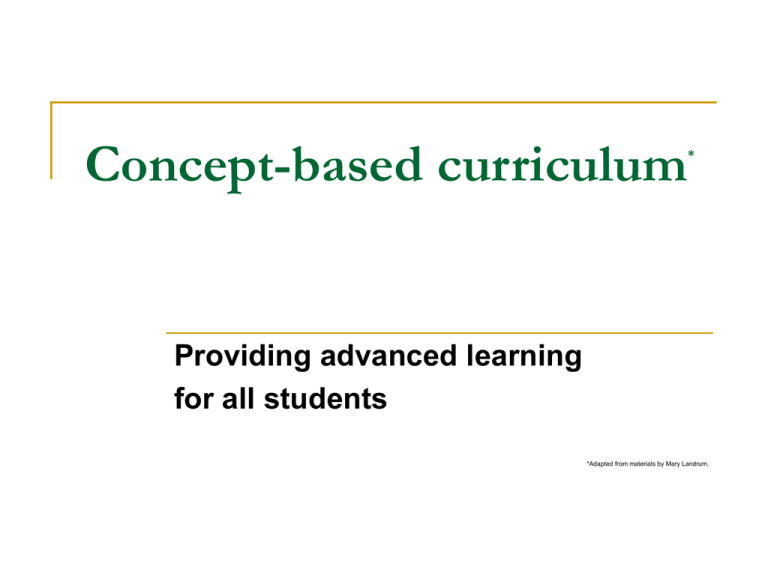
Concept-based curriculum * Providing advanced learning for all students *Adapted from materials by Mary Landrum. Advantages of using a concept-based curriculum Meets needs of advanced students Works in grades K-12 Acknowledges state curriculum standards as minimum requirements for students Creates a culture of learning that promotes continuous progress for all students The need for higher standards: One teacher’s story A tenth-grade biology teacher said that she had spent years— more than 5—developing a rigorous and advanced curriculum for her students. This teacher held a doctorate in biology and worked with several college-level faculty on developing her yearlong curriculum. Students responded well and worked at very sophisticated levels initially. However, after 10 years of minimum student performance standards guiding regular classroom teachers' instruction, this teacher found that even the gifted students were not sufficiently prepared for advanced studies. They had little practice with problem solving, higher-level thinking, and advanced writing skills. This led her to this conclusion: minimal standards have dumbed-down the curriculum enough to stop nurturing the advanced abilities of gifted learners. Rationale for using a concept-based curriculum Due to the emphasis on test scores, many school districts have shifted their focus to struggling learners. Above-average students are often waiting for other students to catch-up before teachers move on to new areas of study. Gifted and advanced students are used as peer tutors for students having difficulty mastering basic knowledge and skills. Advanced learners should be allowed to continue to move at a pace commensurate with their learning needs. Superintendent’s district-wide mandate "Our goals are to meet the minimum curriculum standards developed at the state and district levels and to provide learning experiences that allow all students to learn at a pace and rate commensurate with their learning needs, including advanced learners. We will move beyond a largely factual curriculum and provide sophisticated learning for our highest-level students." What do experts say about conceptbased curricula? Lynn Erickson, a nationally recognized leader in general education curriculum design, has said that teaching concepts help students to understand conceptual attributes by experiencing a concept across many diverse examples, and learn how to identify and understand major conceptual ideas (generalizations) that emerge out of the study of specific topics in each discipline. Sandra Kaplan, a leader in the field of differentiated curriculum for the gifted, has demonstrated how concept-based learning leads to the sophisticated and complex learning experience that gifted learners need. It is only with more conceptual learning (versus factual level learning) that the most sophisticated learning can occur. Definitions Concepts force thinking to the integration level. Students see patterns and connections at a conceptual level as they relate a topic to a broader study framed by the concept. Generalizations are deeper, transferable ideas through time and across cultures. Generalizations are statements of conceptual relationships. A generalization is a big idea or general statement including many concepts or ideas. Topics are terms used to describe the simplest of relationships of facts. Topics name a group of facts that are connected. Sample topics and concepts Topics US government Edgar Allen Poe cells short story fractions inventions seasons transportation water mysteries Concepts power structure evolution expression patterns Sample concepts and generalizations Concept = Adaptation Generalizations include the following: Adaptation takes various forms. Adaptation follows progress. Adaptation is necessary for survival. Concept = Change Generalizations include the following: Change is continuous. Change can be good and bad. Change causes change. Sample concepts and generalizations (continued) Concept = Expression Generalizations include the following: Expression promotes change. Expression transcends time. Expression is universal. Expression affects understanding. Concept = Structure Generalizations include the following: Structure has parts that go together. A structure is only as strong as its parts. Structures are natural and manmade. Structures can facilitate or hinder change. The power of concepts: Another teacher’s story You all know that I have a student teacher this semester. The other day she was reading one of our required readings to the children, Bring the Rain to Kapiti Plain. As you all know I have students of all ability levels in my classroom this year. They are all over the place. My student teacher used whole-group instruction as the primary format for teaching this diverse group. After reading this beautiful African folktale about the circle of life, she asked where the story had taken place. Of course the students don't know directly from the story, but rather, have to deduce this information from the clues in the story. When the student teacher asked the class, ‘Where might this story have taken place?' only one student responded. Jeremy indicated that he thought the story came from upper Africa because of the drought depicted in the story and the dark skin of the characters. Another student added that they were wearing clothes that looked like sundresses. When she asked the children who spoke to tell her how they arrived at their ideas, Jeremy noted that there were many clues about the people's culture. Culture is a difficult concept to understand. It is one that fits into many of our units of study in second grade. If teachers worked on one concept and accompanying generalizations all year long, more complex learning like that illustrated in this example could take place. FAQs Q: I'm a little confused because the state curriculum guide outlines ‘concepts' for each unit of study, but I’m not sure they match what you have in mind. Can you explain the difference? A: The state curriculum documents contain discipline-specific concepts rather than universal concepts. These concepts fit neatly into specific disciplines or have different meanings for different disciplines. On the other hand, universal concepts have the same meaning and apply to three or more disciplines similarly. ----------------- Q: The textbooks I find available don't begin to include concepts, but rather contain mostly facts. So where will we find the concepts to teach? A: Most textbooks contain topics rather than concepts. We want to use universal concepts that are developed through each of your subject areas. I would suggest that you select concepts that are rich in meaning in the discipline that you teach in order to promote complex and sophisticated learning beyond basic facts. Teaching these concepts will help student learn the basic skills, understandings, and ideas necessary to satisfactorily master material for required tests as well as guide more complex learning. ----------------- Other Questions? Summer concept-based curriculum writing institute July 6th – 20th Sign up now to claim your free laptop!
